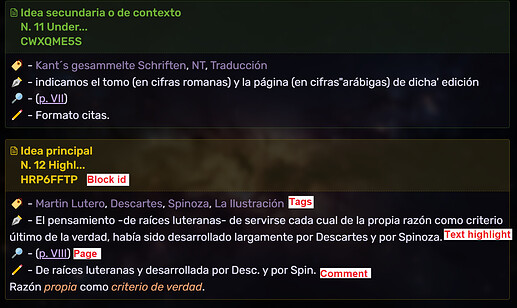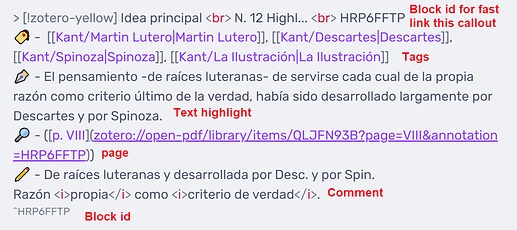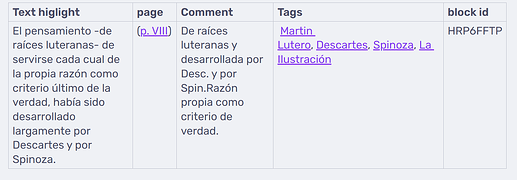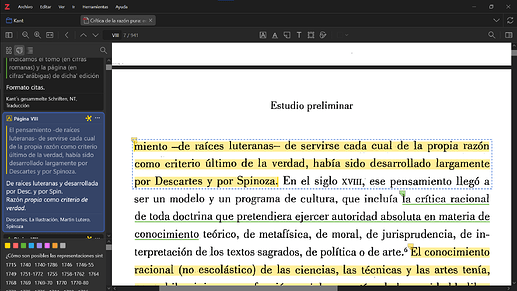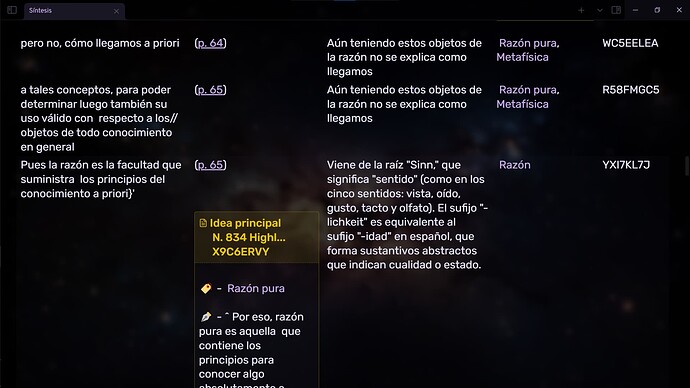The raw markdown of one annotation:
> [!zotero-yellow] Idea principal <br> N. 12 Highl... <br> HRP6FFTP
🏷 - [[Kant/Martin Lutero|Martin Lutero]], [[Kant/Descartes|Descartes]], [[Kant/Spinoza|Spinoza]], [[Kant/La Ilustración|La Ilustración]]
✒ - El pensamiento -de raíces luteranas- de servirse cada cual de la propia razón como criterio último de la verdad, había sido desarrollado largamente por Descartes y por Spinoza.
🔎 - ([p. VIII](zotero://open-pdf/library/items/QLJFN93B?page=VIII&annotation=HRP6FFTP))
✏ - De raíces luteranas y desarrollada por Desc. y por Spin.
Razón <i>propia</i> como <i>criterio de verdad</i>.
^HRP6FFTP
This is how look in zotero
And this is the template for export to Obsidian by Zotero Integration:
Zotero Integration TEMPLATE
{#- infer latest annotation Date -#}
{%- macro maxAnnotationsDate() -%}
{%- set tempDate = "" -%}
{%- for a in annotations -%}
{%- set testDate = a.date | format("YYYY-MM-DD#HH:mm:ss") -%}
{%- if testDate > tempDate or tempDate == ""-%}
{%- set tempDate = testDate -%}
{%- endif -%}
{%- endfor -%}
{{tempDate}}
{%- endmacro -%}
{%- set colorCategoryToMeaning = {
"yellow": "Idea principal",
"red": "Definición (es)",
"green": "Idea secundaria o de contexto",
"blue": "Dato historico",
"purple": "Parrafo",
"magenta": "Refencia a personalidades",
"orange": "Obras y producciones",
"gray": "Preguntas y referencias"
}-%}
{# lookup Zotero colors in annotations with Category #}
{%- macro getMeaning(colorCategory) -%}
{%- if colorCategory-%}
{{- colorCategoryToMeaning[colorCategory] -}}
{%- else -%}
{{- colorCategoryToMeaning["yellow"] -}}
{%- endif -%}
{%- endmacro -%}
{#- handle space characters in zotero tags -#}
{%- macro printTags(rawTags) -%}
{%- if rawTags.length > 0 -%}
{% set comma = joiner() %}
{%- for tag in rawTags -%}
{{- comma() }} [[Kant/{{ tag.tag }}|{{ tag.tag }}]]
{%- endfor %}
{%- endif %}
{%- endmacro -%}
{%- set inline_fields = {
"abtract": abstractNote,
"Zotero": pdfZoteroLink,
"Local": pdfLink,
"Bibliografía": '"' ~ bibliography ~ '"'
}
-%}
{%- set frontmatter_fields = {
"title": '"' ~ (title | replace ('"','') or caseTitle | replace ('"','')) ~ '"',
"authors": '[' ~ authors | replace (";", ", ") ~ ']',
"editors": '[' ~ editors | replace (";", ", ") ~ ']',
"directors": '[' ~ directors | replace (";", ", ") ~ ']',
"translators": '[' ~ translators | replace (";", ", ") ~ ']',
"podcasters": '[' ~ podcasters | replace (";", ", ") ~ ']',
"scriptwriters": '[' ~ scriptwriters | replace (";", ", ") ~ ']',
"Tags": allTags | replace (" ", "_") | replace (",_", " "),
"first-entry": minAnnotationsDate,
"last-entry": maxAnnotationsDate,
"year": date | format("YYYY"),
"date": date | format("YYYY-MM-DD"),
"citekey": citekey,
"pages": numPages,
"running-time": runningTime,
"type": type,
"class": itemType,
"language": language,
"url": url,
"isbn": ISBN}
-%}
{# generate field safely -#}
{%- macro generateField(prefix, delimiter, f, p) -%}
{%- if p and p != "[undefined]"-%}
{{prefix}}{{f}}{{delimiter}}{{p}}
{% endif %}
{%- endmacro -%}
{#- generate fields based on Zotero properties -#}
{%- macro generateFields(prefix, delimiter, fields) -%}
{%- for field, property in fields -%}
{%- if property.length > 0 -%}
{{- generateField(prefix, delimiter, field, property) -}}
{%- endif -%}
{%- endfor -%}
{%- endmacro -%}
---
aliases: ["{{title}}"{%- if authors and date-%}, "
{%- for author in authors -%}
{{author}}
{%- endfor -%}
{{" ("+date | format("YYYY") +") "}}{{title}}{{caseTitle}}"{%- endif -%}]
{{generateFields("",": ",frontmatter_fields) -}}
---
> [!info]- Metadata
{{generateFields("",": ",inline_fields) -}}
> > [!NOTE]- Abstract
{% if abstractNote.length > 0 %}
> > {{abstractNote}}
{% else -%}
> > No se encontró abstract disponible.
{% endif -%}
{% if relations.length > 0 -%}
> > [!note]- Referencias:
> >
> > | Nota | Zotero Link |
> > | --- | --- |
{%- for r in relations %}
> > | [[{{r.title}}]] | [PDF]({{r.desktopURI}}) |
{%- endfor -%}
{%- else -%}
>
> > [!note]- Referencias:
> > No se encontraron referencias.
{%- endif -%}
{{ "" }}
**<center>Anotaciones.</center>**
{%- set newAnnotations = annotations | filterby("date", "dateafter", lastImportDate) -%}
{% if newAnnotations.length > 0 %}
*Fecha importación nuevas anotaciones*: {{importDate | format("YY-MM-DD | HH:mm")}}
{%- set noteIndex = 1 -%}
{% for annotation in newAnnotations %}
{% if annotation.type == "note" and annotation.color == "#a28ae5"%}
> [!zotero-{{annotation.colorCategory | lower}}] {{getMeaning(annotation.colorCategory | lower)}} n. {{ noteIndex }} {%- set noteIndex = noteIndex + 1 %} <br> N. {{ loop.index }} {{annotation.type|capitalize}} <br> {{ annotation.id }}
{%- else %}
> [!zotero-{{annotation.colorCategory | lower}}] {{ getMeaning(annotation.colorCategory | lower) }} <br> N. {{ loop.index }} {{annotation.type|capitalize | truncate(5)}} <br> {{ annotation.id }}
{%- endif %}
{%- if annotation.tags.length > 0 %}
🏷 - {{printTags(annotation.tags)}}
{%- endif %}
{%- if annotation.annotatedText.length > 0 %}
✒ - {{annotation.annotatedText}}
{%- endif %}
{%- if annotation.imageRelativePath %}
> ![[{{annotation.imageRelativePath}}|300]]
{%- endif %}
{%- if annotation.desktopURI %}
🔎 - ([p. {{annotation.pageLabel}}]({{annotation.desktopURI}}))
{%- endif %}
{%- if annotation.comment %}
✏ - {{annotation.comment | replace ("<b>", "") | replace ("</b>", "") | replace ("- ", ">- ")}}
{%- endif -%}
{{" "}}
^{{ annotation.id }}
{% endfor %}
{# {% endfor %} #}
{%- endif -%}
